Do you need a travertine paver repair? Whether you live in the Buckhead community or not, a pool deck with travertine pavers is a great feature; however, you need to make sure they’re correctly installed.
A recent travertine pool decking repair in the Buckhead community of Richmond Hill, GA, perfectly illustrates the importance of this statement.
We have helped countless homeowners with travertine tile repair, paver repairs, and correcting other hardscaping issues. This post will walk you through a specific project where Coastal Hardscapes expertly repaired and reset 12 travertine paver stones that had become uneven and sunken.
Why Your Travertine Pavers Might Be Uneven
Picture this: you have a $75,000 pool installed, and just a few years later, you have to hire a local hardscaping company to repair the pool deck, or in this case, the travertine pavers around the pool.
How could this happen??
Uneven and sunken travertine pavers are often the result of several factors working together, gradually undermining the base beneath your beautiful stone and allowing movement over time. Here in Buckhead and the wider Richmond Hill area, common culprits of paver issues include natural soil settling and moisture.
These issues don’t just affect curb appeal; they also become trip hazards, impacting your pool’s aesthetics, safety, and even the warranty of your hardscaping.
Common local causes we often see include:
- Settling soil, which creates hidden voids beneath pavers, allows stones to sink.
- Sprinkler line moisture, leaks, or overspray that softens bedding sand and erodes vital base materials.
- Poor base preparation or erosion can leave uncompacted areas prone to unwanted movement.
This deep dive into causes naturally leads us to how we meticulously inspected and corrected each of these factors during our Buckhead project.
How Soil Settling Impacts Your Travertine Pool Deck
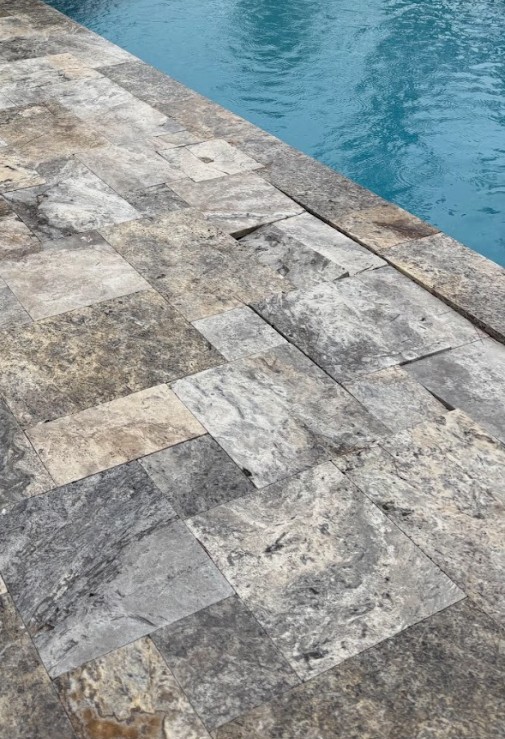
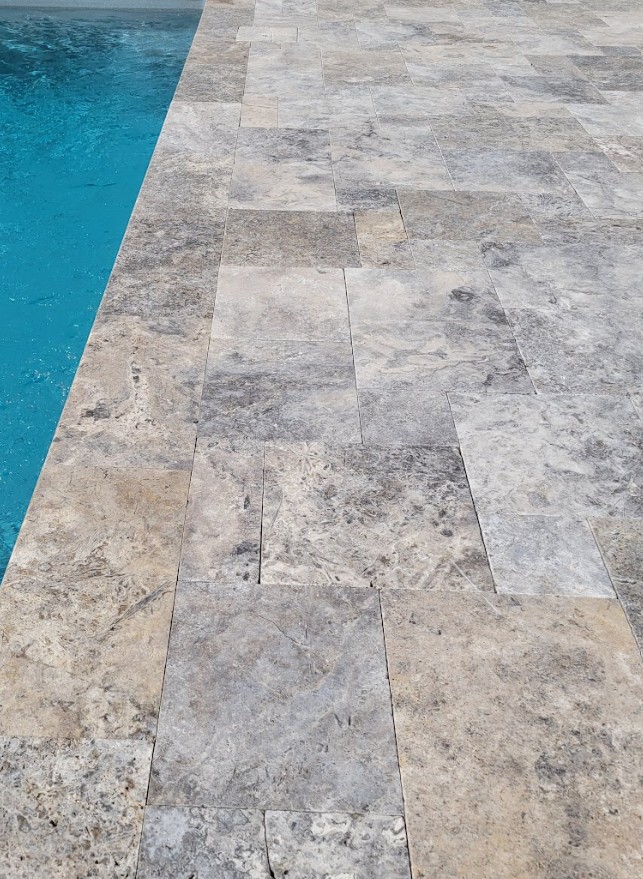
Soil settling directly impacts travertine pool decks by reducing the crucial support beneath the bedding sand and base material, allowing individual stones to shift or sink. In our coastal and near-coastal zones, such as Richmond Hill, seasonal rains and fluctuating moisture levels can accelerate compaction and the formation of voids, especially if the original base wasn’t properly compacted.
Homeowners typically start noticing low spots, uneven seams, or new trip hazards near pool edges and steps when settling begins. Pinpointing this settling during our inspection was key to our decision to lift the affected stones and re-establish a fully compacted base, ensuring the problem wouldn’t return.
This discussion of settling naturally connects to another frequent, moisture-related culprit: irrigation systems and the issues with sprinkler lines.
Can Sprinkler Line Moisture Lead to Pool Deck Damage?
Absolutely! Sprinkler line moisture can be a primary driver of pool deck deterioration, especially when leaks or overspray keep bedding sand constantly damp and mobile. Consistent or even intermittent irrigation water can flow into joints and beneath pavers, washing finer particles out of the base and gradually reducing its compaction strength. In the Buckhead repair, clear evidence of moisture near the 12 affected stones immediately pointed to an irrigation adjustment as a vital part of our durable solution.
Before we outline our precise repair process, here’s a quick summary of causes, mechanisms, and effects for easy comparison.
| Cause | Mechanism | Effect |
|---|---|---|
| Settling soil | Natural compaction and void formation beneath base | Sunken or uneven pavers, trip hazards |
| Sprinkler moisture | Natural compaction and void formation beneath the base | Loss of support, shifting joints |
| Poor base prep | Inadequate compaction or thin base layers | Early movement and uneven surfaces |
These identified root causes directly guided the sequence of actions we took during the Buckhead project.
How Coastal Hardscapes Completed a Travertine Paver Repair in Richmond Hill & Buckhead
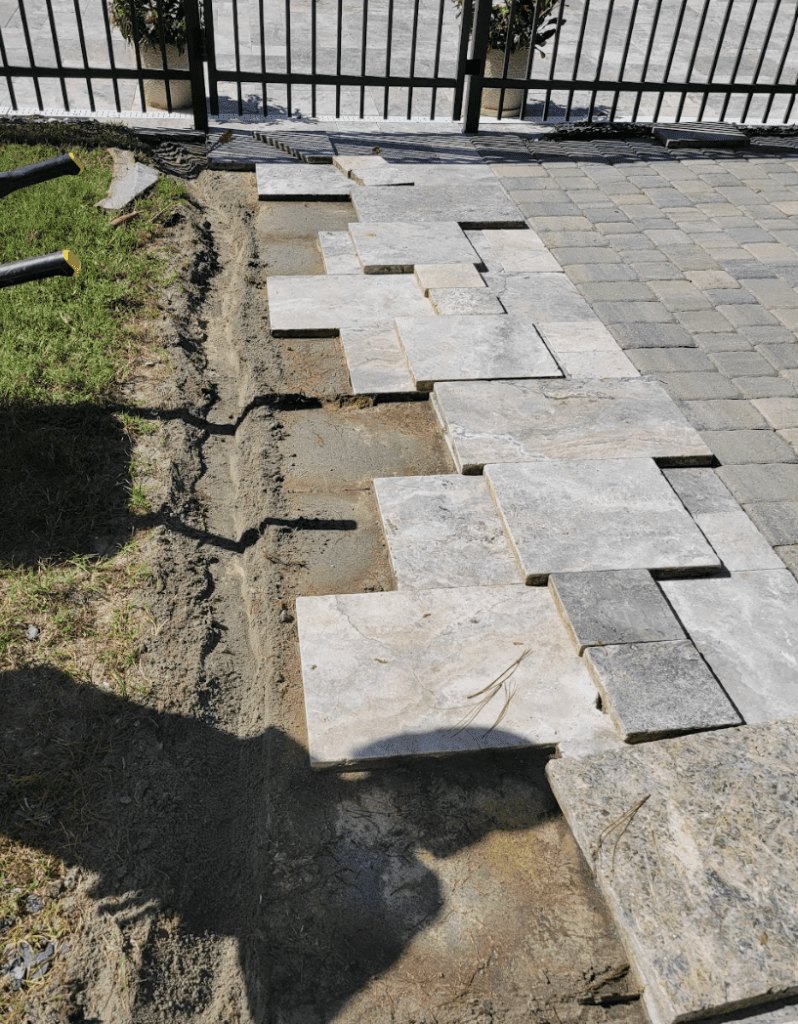
At Coastal Hardscapes, we follow a simple, step-by-step repair workflow that prioritizes thorough inspection and a robust base restoration to restore a level, safe, and beautiful travertine pavers.
To make our workflow easy to understand, here are the main steps we performed on the Buckhead project:
- Inspect and carefully mark affected stones for removal and detailed assessment.
- Gently lift, clean, and inspect each travertine paver for any chips or damage.
- Meticulously re-level and compact the base material, replacing bedding sand as needed.
- Adjust sprinkler line alignment and repair any leaks to prevent future moisture infiltration.
- Reinstall pavers, apply polymeric jointing or appropriate sand, and seal the surface for lasting beauty.
Each of these steps directly addresses a specific failure mode, and the next table clearly maps each step to its purpose.
| Step | Action | Purpose |
|---|---|---|
| Lift pavers | Remove affected stones carefully | Inspect condition; remove debris and saturated sand |
| Re-level & compact | Add/compact bedding sand and base material | Restore uniform support and prevent future sinking |
| Adjust irrigation | Reposition nozzles; repair leaks if found | Eliminate the moisture source that weakens the base |
| Reinstall & seal | Eliminate the moisture source that weakens base | Lock joints, protect stone, and improve appearance |
Adhering to this precise, stepwise method not only preserves the integrity of your travertine but also creates a seamless, safe pool deck that stands strong against Richmond Hill’s unique climate.
Step-by-Step Travertine Paver Repair Process

Need travertine paver repair near you? In most cases, travertine paver re-leveling and pool decking repairs are a quick fix compared to concrete slab repairs.
First, we carefully mark and lift the problematic stones, clearing away any organic material or saturated sand to expose the base beneath fully. Second, we thoroughly evaluate the base depth and material, adding and compacting properly graded bedding sand or base aggregate until the sub-surface meets our rigorous compaction standards. Third, we meticulously test-fit each travertine paver, adjusting it to achieve perfectly even joints and level planes, then secure those joints with polymeric sand or our recommended jointing compound.
Finally, we apply a compatible sealer to protect the stone and inhibit future water penetration into the joints. These precise procedural steps create a truly durable result that addresses both the visible symptoms and the underlying root causes.
Travertine is Still the Perfect Choice for Your Buckhead Pool Deck
All this talk about travertine paver repair might have you second-guessing travertine as a viable solution for your patio or even around your pool. Don’t let it bother you!
Travertine remains a highly sought-after natural stone choice for pool decks, as it offers both aesthetic appeal and cooling properties, making it ideal for outdoor living spaces in Richmond Hill, GA. As a premium natural stone paver, travertine offers specific, compelling benefits—namely exceptional thermal resistance, excellent textured slip performance, and a timeless, weathered look that matures gracefully.
When installed and maintained correctly with proper base preparation, compaction, and periodic sealing, travertine provides incredible long-term value and truly enhances your outdoor entertaining areas. Given our local climate and moisture considerations, correct installation and post-repair sealing are crucial for ensuring the lasting beauty and longevity of the product.
Homeowners consistently choose travertine for these fantastic, homeowner-focused advantages:
- Its natural appearance instantly boosts curb appeal and elevates outdoor spaces.
- It offers significantly cooler surface temperatures compared with many manufactured pavers.
- It provides a durable surface that, with proper maintenance, resists wear and looks elegant for years.
These impressive material benefits naturally bring up questions about climate impacts and maintenance schedules, which we’ll address next.
The Durability & Thermal Resistance of Travertine Tiles

The biggest complaint about Coastal Georgia in the Summer? It is hot, like scorching hot!
Luckily, travertine provides thermal resistance unlike concrete, making it incredibly comfortable on bare feet and reducing thermal stress on the stone surface. This makes it ideal for use around your pool, and it’s also a more durable option than concrete or paver stones.
Aesthetically, travertine boasts a stunning range of natural tones and subtle veining that, together, create an inviting, resort-like ambiance around any pool in Georgia. You can read more about travetine heat resistance here!
Coastal Living: How Richmond Hill’s Climate Affects Your Travertine Pool Deck Longevity
Richmond Hill’s coastal climate is not friendly. Between the humidity, frequent rain, and the occasional heavy storm that occurs almost daily in the summer, it can accelerate settling and moisture issues in travertine pool decks. When drainage or irrigation is not properly dialed in, the base can soften, causing stones to shift or sink. Even the light salt air in coastal-adjacent areas can influence which sealers and maintenance steps work best.
Simple habits, such as checking drainage, watching sprinkler spray, and keeping your travertine sealed, go a long way. Understanding how our local weather affects your pool deck makes it easier to schedule the right maintenance and prevent costly repairs.
Travertine Maintenance Tips
Homeowners can keep their travertine pool decks looking great with a few simple habits: clean gently, seal consistently, and manage water properly. A pH-neutral cleaner and a soft brush are all you need for day-to-day cleaning. Skip anything acidic or abrasive to prevent etching the stone or stripping the sealer.
Sealing on a routine schedule (or right after repairs) creates a moisture barrier that protects the joints, reduces staining, and helps prevent future settling. Follow the product or installer’s recommendations for reapplication frequency.
One of the biggest factors we see in Richmond Hill and Buckhead repairs is water. Check your sprinklers for overspray, address drainage issues promptly, and ensure that no water is seeping onto the edges of your deck. Good irrigation control alone can stop most moisture-driven base failures.
Practical steps you can take today:
• Clean with pH-neutral soaps and soft brushes
• Reseal on the recommended schedule
• Correct sprinkler overspray and eliminate pooling water
These simple, consistent habits protect your travertine, keep it looking sharp, and significantly reduce the chances of needing uneven paver repairs down the road.
Professional Travertine Pool Deck Repair in Buckhead
Several factors naturally influence the cost of travertine pool deck repair, and professional maintenance consistently delivers benefits that often far outweigh do-it-yourself attempts. Key cost drivers include the number of stones needing attention (our Buckhead project involved 12 travertine pavers), the extent of base re-leveling required, accessibility around your pool, and whether crucial irrigation repairs are necessary.
A professional hardscaping team, like Coastal Hardscapes, brings invaluable expertise and skill sets that DIY fixes can’t match. While DIY fixes may seem less expensive initially, hidden costs—such as incorrect compaction, inadequate jointing, or missed irrigation issues- can unfortunately lead to recurring repairs and greater expenses down the road.
Factors that commonly influence pricing include:
- The scale of the repair (number of stones and the overall area affected).
- The condition of the base and the need for re-leveling or drainage correction.
- Specific materials required (bedding sand, jointing compounds, sealer).
- Labor complexity and site access around your pool.
To clarify cost-related considerations, the table below lists common factors and their impact on the scope of your repair.
| Factor | Why it matters | Impact on cost |
|---|---|---|
| Number of stones | More stones require more labor and materials | Higher labor and material costs |
| Base condition | Damaged or soft base needs re-leveling and compaction | Increased labor and possible extra materials |
| Irrigation repairs | Fixing leaks or overspray prevents recurrence | Adds scope but reduces future calls |
| Materials & sealing | Quality jointing and sealer affect longevity | Upfront cost for longer-lasting results |
A quick comparison clarifies the professional vs. DIY trade-offs and truly highlights the long-term value of expert service.
Cost: Which Factors Influence the Price of Pool Deck Paver Repairs?
Pricing for travertine repairs is pretty straightforward.
The overall scale of the repair determines the price of your pool deck paver repair, the integrity of the base, your material choices, and whether additional trades (such as irrigation specialists) need to be engaged. Accessibility around your pool, think tight corners, steps, or existing landscaped beds, also affects labor time and the protective measures required.
Materials such as polymeric sand for joints and professional-grade sealer add predictable costs but significantly extend the life of your repair. Asking contractors about their inspection findings, compaction methods, and sealer specifications helps homeowners compare quotes based on the quality of the process and expected longevity, rather than just the initial price tag.
Understanding these key drivers sets the stage for comparing the outcomes between professional and DIY efforts.
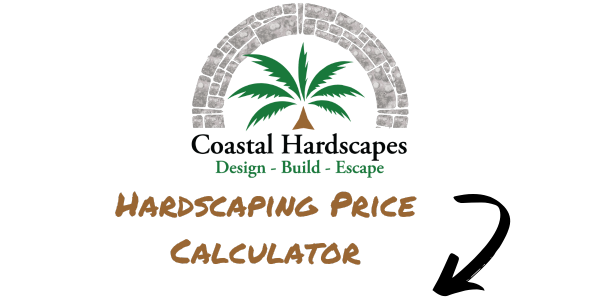
DIY vs. Pro: Why Professional Travertine Repair Makes a Difference
Professional repair consistently delivers longer-lasting, safer outcomes because our skilled technicians address the actual root causes—such as compaction deficits and moisture sources—rather than just treating the visible symptoms. Pros utilize specialized compaction tools, proper bedding mixes, and sealing systems perfectly matched to travertine, along with a diagnostic inspection of irrigation systems that DIYers often overlook.
While DIY can work for minimal cosmetic adjustments, it risks repeat sinking, uneven joints, and compromised safety when foundational issues persist. Investing in professional intervention often results in fewer callbacks and far better long-term value for discerning pool deck owners.
Concluding our cost discussion, the final section summarizes the fantastic results homeowners can expect when hiring a local specialist like Coastal Hardscapes.
What Homeowners Can Expect from Coastal Hardscapes’ Travertine Pool Deck Repairs
Homeowners can absolutely expect a beautifully restored, smooth pool deck surface that is not only safer but also more visually cohesive and perfectly ready for outdoor entertaining once our repairs are complete. In the Buckhead community project, Coastal Hardscapes meticulously lifted, cleaned, and reset 12 travertine paver stones, expertly re-leveled and compacted the base, precisely adjusted the sprinkler line to eliminate moisture-driven movement, and sealed the finished surface for both protection and enhanced appearance.
The combined outcome completely removed trip hazards, restored perfectly even joints and planes, and beautifully enhanced the deck’s natural stone look, making the entire area more inviting and significantly safer for family enjoyment.
What the Buckhead project delivered in practical terms included:
- A perfectly level surface that eliminates trip hazards and unsightly uneven seams.
- Stunning aesthetic improvements from thorough cleaning and sealing that truly renew the stone’s natural color.
- Crucial preventive irrigation adjustments and compaction that significantly reduce the chance of repeat sinking.
Bringing Back the Best: How We Restored Safety and Visual Appeal to the Buckhead Pool Deck
The Buckhead repair dramatically restored safety by eliminating all low spots and perfectly leveling the 12 affected travertine stones, thereby removing visible trip hazards and stabilizing walking planes.
Visual appeal was significantly improved through thorough cleaning, precise resetting of stones for perfectly even joints, and a final sealer that beautifully refreshed the travertine’s natural tones. Repair durability was significantly increased by addressing the underlying causes.
These impressive project results invite homeowners to explore additional examples and learn about our comprehensive range of services.
Final Word on Travertine Replacement & Repairs:
If you’re noticing uneven or sunken travertine around your pool, the next best step is a quick on-site inspection. Coastal Hardscapes can inspect your irrigation, base, and stone movement to determine whether you need a simple re-level and seal or a more comprehensive repair.
Examining our recent Richmond Hill and Buckhead projects can also help you understand what similar repairs entail. An inspection gives you a clear scope, whether it’s fixing 12 stones or something larger—and a quote based on exactly what your pool deck needs. Addressing issues early helps you avoid bigger costs down the road.
Frequently Asked Questions About Travertine Pool Deck Repair & Maintenance
1. What maintenance practices can extend the life of your travertine pool deck?
In coastal Georgia, simple habits go a long way. Clean with pH-neutral soap and a soft brush to protect the stone. Reseal on a routine schedule to guard against moisture and stains. And always watch your irrigation—misaligned sprinklers or hidden leaks are one of the biggest causes of sinking travertine in Richmond Hill and nearby coastal neighborhoods. These basics help your deck stay level and beautiful for years.
2. How often should you seal your travertine pool deck?
Most travertine pool decks in our humid, coastal climate need sealing every 1–3 years. Foot traffic, sun exposure, and the type of sealer all affect timing. If water stops beading on the surface or stains appear faster than usual, it’s time to reseal. Maintaining a seal protects against moisture intrusion—the primary cause of shifting pavers in this region.
3. What are the key signs your travertine pool deck needs repair?
Watch for uneven or sunken pavers, cracks, or gaps between stones—these are common in areas with heavy rainfall, such as Richmond Hill and Pooler. Pooling water is another warning sign that the base may be softening. Catching these issues early prevents bigger structural problems and keeps your pool area safe.
4. Can travertine pool decks be repaired in cold weather?
Repairs can be done in cooler weather, but it’s not ideal. Cold temperatures slow curing and can weaken sealers or setting materials. If a winter repair is unavoidable, we use products designed explicitly for low-temperature installations and closely monitor the conditions. Avoid repairs during freezing temperatures for the best long-term results.
5. What should homeowners know about DIY travertine repairs?
DIY travertine repair may seem simple, but most issues stem from the base—not the stone. Moisture problems and soft spots require specialized tools and professional expertise. If a repair isn’t done correctly, the pavers usually settle again. Research your options and consider a professional if you want a long-lasting fix.
6. How can homeowners choose the right professional for travertine repairs?
Look for a contractor with real experience in travertine paver repair and pool-deck work—not just general landscaping. Check reviews, ask for photos of recent jobs in Richmond Hill or Savannah, and make sure they provide a clear scope of work. A quality professional will explain how they repair the base, reset the stone, and prevent the issue from recurring.
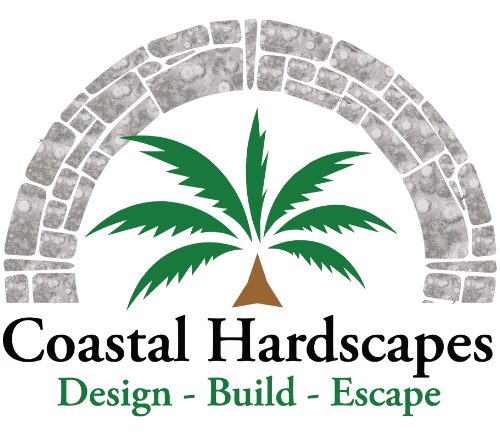
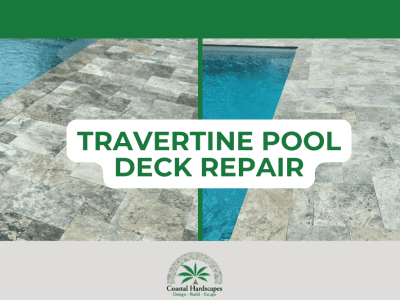
 Patio Repairs Savannah – How to Fix Cracked & Uneven Patios
Patio Repairs Savannah – How to Fix Cracked & Uneven Patios